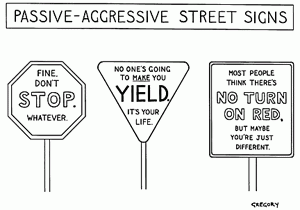One of my goals for this year is to work on saying what I mean and meaning what I say. I can be a people-pleaser, so I sometimes say “yes” to things that I don’t want to do. Though I am pretty direct, I also fight the tendency to say what I think people want to hear versus what I want to say. Also, like many people, I can occasionally act “passive aggressively” which can mean saying one thing, but behaving in a way that is not consistent with it to get true feelings across. No one wants to be called “passive aggressive,” but it is hard not to be guilty of it at some point.
Our family friend, Dr. Andrea Brandt, Ph.D, M.F.T, recently wrote a book called 8 Keys to Eliminating Passive Aggressive Behavior. She sent me a review copy to check out. Andrea brings over 30 years of clinical experience to the role of psychotherapist, speaker, and author. She is a recognized expert in treating a full range of emotional issues, including anger, aggression, anxiety, aging, relationships, work-life balance, workplace, and women’s issues.
 The blurb on Amazon is:
The blurb on Amazon is:
“Many people often say “yes” to something when they’d rather say “no.” They offer cooperation through words but follow up with how they really feel—in actions that contradict their words. That’s passive-aggression. At its heart, passive-aggression is about being untrue to oneself, which makes it impossible to have a clean relationship with others. Passive-aggression as a communication method doesn’t make someone “bad.” It is simply a strategy learned in childhood as a coping mechanism, a hard-to-break habit. Changing passive-aggressive behavior requires knowledge, tools, and practice, as outlined here.”
The book offers effective methods for transforming passive-aggression into healthy assertiveness to communicate in constructive ways through eight keys:
- Recognize Your Hidden Anger
- Reconnect Your Emotions to Your Thoughts
- Listen to Your Body; Set Healthy Boundaries
- Communicate Assertively
- Interact Using Mindfulness
- Disable the Enabler
- Problem-Solve for Better Outcomes.
The chapters offer exercises that you can do as well as very clear examples of people behaving passive aggressively to help you identify the behavior. The format was easy to read and to understand. It was easy to see ways in which I occasionally behaved this way, or dealt with others in a way, that was passive-aggressive (as much as I hate to admit it!)
Over the holidays, I mentioned to Andrea that this title might be off-putting to people. Who wants to admit they need help to be less passive aggressive? She told me that she was solicited by the publisher to be a part of the “8 Keys to Mental Health” series and that she had no input to the title. The intention of this series is to be “filled with exercises and practical strategies, these books empower readers to help themselves.” They are self help guides that seem to actually be actionable and helpful!
I think this book could help almost anyone to improve relationships and to communicate more effectively. I especially liked the exercises and examples in Key 2: Reconnect Your Emotions to Your Thoughts. The chapter helps you to see that thoughts and beliefs become so ingrained that we think “that is the way things are” and that our views are facts instead of opinions. If a person grows up to react to things in a specific way based on irrational beliefs, it can be easy to behave in passive aggressive ways. The chapter helps to identify such beliefs and provides strategies for working on opening your world view more broadly. I think identifying some of these mental traps is super helpful into communicating more effectively and openly. Since I read the book, I have been trying to notice when I my thoughts may not be rational and to work on changing my reactions and behaviors.
Andrea was on Ask Beatty on PRN talking about her book. Beatty called it a “must-read for everyone who is interested in improving their communication and problem-solving skills.” Here is the podcast:
Andrea was also featured on Marilu with Marilu Henner. Check out that show HERE.
For more information on Dr. Brandt, visit her website, follow on Facebook, Twitter or LinkedIn. You can buy the book on Amazon HERE.
Do you think being called “passive agressive” is an insult? Do you think the tips in this book would be helpful for you or someone you know?
Please Note: I was provided a complimentary review copy of this book, but I was not compensated for this post. All opinions are my own.



